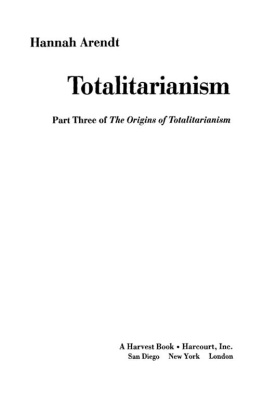Mattias Desmet - The Psychology of Totalitarianism
Here you can read online Mattias Desmet - The Psychology of Totalitarianism full text of the book (entire story) in english for free. Download pdf and epub, get meaning, cover and reviews about this ebook. publisher: Chelsea Green Publishing, genre: Religion. Description of the work, (preface) as well as reviews are available. Best literature library LitArk.com created for fans of good reading and offers a wide selection of genres:
Romance novel
Science fiction
Adventure
Detective
Science
History
Home and family
Prose
Art
Politics
Computer
Non-fiction
Religion
Business
Children
Humor
Choose a favorite category and find really read worthwhile books. Enjoy immersion in the world of imagination, feel the emotions of the characters or learn something new for yourself, make an fascinating discovery.

- Book:The Psychology of Totalitarianism
- Author:
- Publisher:Chelsea Green Publishing
- Genre:
- Rating:4 / 5
- Favourites:Add to favourites
- Your mark:
- 80
- 1
- 2
- 3
- 4
- 5
The Psychology of Totalitarianism: summary, description and annotation
We offer to read an annotation, description, summary or preface (depends on what the author of the book "The Psychology of Totalitarianism" wrote himself). If you haven't found the necessary information about the book — write in the comments, we will try to find it.
The Psychology of Totalitarianism — read online for free the complete book (whole text) full work
Below is the text of the book, divided by pages. System saving the place of the last page read, allows you to conveniently read the book "The Psychology of Totalitarianism" online for free, without having to search again every time where you left off. Put a bookmark, and you can go to the page where you finished reading at any time.
Font size:
Interval:
Bookmark:

As I walk through the halls of a major US medical center, I see eyes that divert themselves away from me as I pass. When we engage in our usual discussions on patients, the topic of COVID-19 vaccination brings a halting response: We dont want to talk about it. I see fear, shame, and a never-ending cycle of groupthink that has been more contagious among physicians than aerosolized SARS-CoV-2 in a crowded elevator. Mattias Desmet, like a guided missile, has hit the target. The medical community is in mass formation and this led to a much larger penumbra that has enveloped the general population. In this book, Desmet has constructed an explanatory framework from which the cohesive fabric is suspended that clearly and concisely explains what is happening and what the next steps are that each and every one of us need to take to break the spell and restore normalcy. A must read for our time.
P ETER A . M C C ULLOUGH , MD, MPH; chief medical advisor, Truth for Health Foundation
Transcending medical controversies, this book offers an indispensable window into the social phenomenon we call COVID.
C HARLES E ISENSTEIN , author of Sacred Economics and The Coronation
Mattias Desmet is the worlds expert on the phenomenon of mass formationand one of the most sincere, thoughtful, and important intellectuals of the twenty-first century. If you want to understand why and how the coronavirus pandemic response unfolded the way it did at a societal level andeven more importantlyhow to prevent such a travesty from happening again, The Psychology of Totalitarianism is essential reading. Desmet shows us how to reclaim our humanity in an increasingly dehumanized and mechanized world.
D R. R EINER F UELLMICH , trial attorney; cofounder, Berlins Corona Investigative Committee
In this masterful book, Desmet asks how we have arrived at the doorstep of totalitarianism. Taking the reader on a wild, scholarly ride through history, science, and psychology, he delivers answers both necessary and unexpected.
H EATHER H EYING , PhD, evolutionary biologist; coauthor of A Hunter-Gatherers Guide to the 21st Century
Desmet is waking a lot of people up to the dangerous place we are now with a brilliant distillation of how we ended up here.
R OBERT F . K ENNEDY, J R.
Mattias Desmets theory of mass formation is the most important lens through which we can understand the COVID-19 pandemic and the social aberrations that accompanied it. In The Psychology of Totalitarianism, Desmet explains how and why people will willingly give up their freedom, how the masses can give rise to a totalitarian leader, andmost importantlyhow we can resist these phenomena and maintain our common humanity. This is the most important book of 2022.
D R. R OBERT M ALONE , author of Lies My Govt Told Me
Mattias Desmets [theory of mass formation hypnosis] is great. Once I kind of started to look for it, I saw it everywhere.
E RIC C LAPTON
THE PSYCHOLOGY OFOTALITARIANISM

MATTIAS DESMET
TRANSLATED BY ELS VANBRABANT
Chelsea Green Publishing
White River Junction, Vermont
London, UK
Copyright 2022 by Mattias Desmet and Pelckmans Uitgevers nv.
Originally published in Belgium by Pelckmans Publishers in 2022 as De Psychologie van Totalitarisme.
English translation copyright 2022 by Chelsea Green Publishing.
All rights reserved.
No part of this book may be transmitted or reproduced in any form by any means without permission in writing from the publisher.
This edition published by Chelsea Green Publishing, 2022.
Translator: Els Vanbrabant
Project Manager: Patricia Stone
Developmental Editor: Brianne Goodspeed
Copy Editor: Angela Boyle
Proofreader: Nancy A. Crompton
Indexer: Shana Milkie
Designer: Melissa Jacobson
Printed in Canada.
First printing May 2022.
10 9 8 7 6 5 4 3 2 122 23 24 25 26
Our Commitment to Green Publishing
Chelsea Green sees publishing as a tool for cultural change and ecological stewardship. We strive to align our book manufacturing practices with our editorial mission and to reduce the impact of our business enterprise in the environment. We print our books and catalogs on chlorine-free recycled paper, using vegetable-based inks whenever possible. This book may cost slightly more because it was printed on paper that contains recycled fiber, and we hope youll agree that its worth it. The Psychology of Totalitarianism was printed on paper supplied by Marquis that is made of recycled materials and other controlled sources.
ISBN 978-1-64502-172-8 (hardcover) | ISBN 978-1-64502-173-5 (ebook)
| ISBN 978-1-64502-174-2 (audio book)
Library of Congress Cataloging-in-Publication Data is available upon request.
Chelsea Green Publishing
85 North Main Street, Suite 120
White River Junction, Vermont USA
Somerset House
London, UK
www.chelseagreen.com
To write a book about totalitarianismthe idea first occurred to me on November 4, 2017. Or rather, it first appeared then in my scientific diary, a notebook I use to scribble down anything that might be useful for a later article or book.
At the time, I was staying at a chalet in the Ardennes, owned by a couple of friends. In the early morning hours, as the rising sun illuminated the surrounding woods, I opened my diary to write down thoughts that had spun during the night. Perhaps it was the peace and quiet of the natural environment that made me more sensitive than usual, but on that November morning, I was gripped by the palpable and acute awareness of a new totalitarianism that had left its seed and made the fabric of society stiffen.
Even by 2017, it could no longer be denied: The grip of governments on private life was growing tremendously fast. We were experiencing an erosion of the right to privacy (especially since 9/11), alternative voices were increasingly censored and suppressed (particularly in the context of the climate debate), the number of intrusive actions by security forces was rising dramatically, and more.
It was not only governments behind these developments, however. The rapid emergence of woke culture and the growing climate movement was giving rise to the call for a new, hyper-strict government that emerged from within the population itself. Terrorists, climate changes, heterosexual men, and, later, viruses were considered too dangerous to be tackled with old-fashioned means. The technological tracking and tracing of populations became increasingly acceptable and was even deemed necessary.
The dystopian vision of the German-Jewish philosopher Hannah Arendt loomed at societys horizon: the emergence of a new totalitarianism, no longer led by flamboyant mob leaders such as Joseph Stalin or Adolf Hitler but by dull bureaucrats and technocrats.
That November morning, I drafted the blueprint for a book in which I would explore the psychological roots of totalitarianism. At the time, I wondered: Why did totalitarianism as a form of statehood emerge for the first time in the first half of the twentieth century? And moreover: What is the difference between it and the classical dictatorships of the past? The essence of this difference, I realized, lies within the field of psychology.
Font size:
Interval:
Bookmark:
Similar books «The Psychology of Totalitarianism»
Look at similar books to The Psychology of Totalitarianism. We have selected literature similar in name and meaning in the hope of providing readers with more options to find new, interesting, not yet read works.
Discussion, reviews of the book The Psychology of Totalitarianism and just readers' own opinions. Leave your comments, write what you think about the work, its meaning or the main characters. Specify what exactly you liked and what you didn't like, and why you think so.









